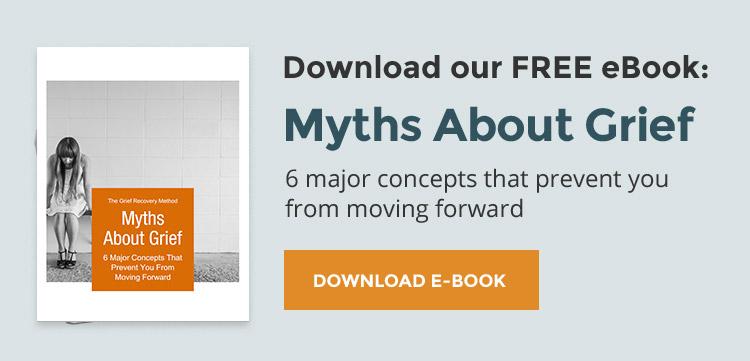
When I came to Grief Recovery for the first time, I was 18 years old. I had lost a pet and a grandparent, and those things were definitely sad for me, but at 18, if you were to ask me, "Do you have unresolved grief?" I would have responded, "What are you talking about?"
At 18, I had enough distractions in my life with athletics, friends, and what the future held. I would have never stopped for a second and thought, "I could benefit from doing Grief Recovery." It was still very foreign to me, but I was part of a family that did this. My dad said, "Okay, you're going to go do this," and the minute I got into the work, and I started doing some of the actions, it was very evident to me very quickly that I did have a bunch of pain in my background that was still there. There was still a lot to look at, to work on, and to free myself of. There was this emotional pain that I wasn't even aware I was carrying.
It was a profound experience that I wish more human beings had. If I could redo my website and have a slogan that didn't sound cool and wasn't catchy, that slogan would be, just because it's the truth:
Welcome to the griefrecoverymethod.com. If you are a human being who has been on this planet for more than seven years, then you're in the right place. There is work that you can do around emotional pain.
One of the biggest hurdles to reaching others is that most people must qualify. They don't self-qualify as a griever. For most people, the term griever is a weird term. Unless you work in this line of work, it's a bizarre concept for people. But every human being I meet is grieving. Whether at the airport, at a social event, or the Little League game for my kids, I know they're a griever.
One of the big concepts we're trying to work with is moving away from the term "griever" because it can be so jarring and unfamiliar to people. Instead, we discuss emotional pain, sadness, and unfinished business. I think more people can relate to those terms, and that's fine. We don't have to call it grief. A lot of people nowadays call it trauma. They call it anxiety. They call it depression. Those are all other aspects of the human experience. I get it. But they're not calling it grief, even though emotional pain is a massive component. Again, call it trauma, call it grief, call it anxiety, call it stress, call it depression, whatever the case may be. But use the Grief Recovery Method to heal. We know it can benefit every human being on this planet.
Sometimes, I'll sit on a plane, tell someone what I do, and say I help people with grief. They often say, "Where were you when I needed you?" I'll say, "What happened?" They'll respond, "Oh, two years ago, my mom died," and the implication will be, "Where were you when I needed you back then?" I know society doesn't give that person any tools to deal with their grief. The truth is, they could still benefit from our services two years after the loss. Still, society continually tells them, "Just move forward. You're going to be fine. Time's going to heal," so they bury all those feelings and think they no longer need any services for grief work.
The key and our challenge as an organization is to politely, lovingly let that person know, "There's still work to be done. We can still help you with that pain." Time may have passed, and memories may have changed. Feelings around the loss may have dulled a bit, and we may have found more distractions, how to not think about Mom or those things that happened. But we can do more. You can do more. More work can be done to heal.
It is the same with divorce, romantic breakups, losing pets, and breaking up friendships, especially with COVID and the political climate in this world. We all have many estranged friendships that we're all hurting over.
You don't have to qualify yourself as a griever. We can call it emotional pain, but the tools from the Grief Recovery Method can benefit you. It can help you with these unfinished events, memories that keep coming up, and people you keep thinking about. That's all unresolved emotional pain.
Our goal is to help people. Every person who visits our website, whether they're here for a friend or to search for someone grieving, the secret is that they're also suffering and have unresolved emotional baggage eating them up inside. This is just the human experience, and for whatever reason, that term is super scary to people. This blog is about getting people comfortable with the fact that we have this emotional pain and that there are things we can do about it. We don't have to qualify it as grief or identify as grievers. None of that matters. The point is that these tools work for everyone.


























Add new comment